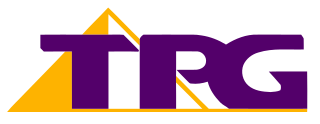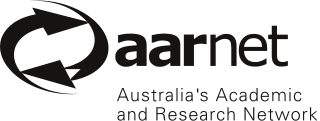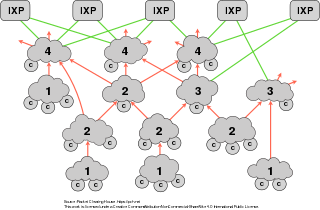Related Research Articles
Telstra Corporation Limited is an Australian telecommunications company which builds and operates telecommunications networks and markets voice, mobile, internet access, pay television and other products and services. It is a member of the S&P/ASX 20 and Australia's largest telecommunications company by market share. Telstra is the largest wireless carrier in Australia, with 18.8 million subscribers as of 2020.

Telecommunications in Australia refers to communication in Australia through electronic means, using devices such as telephone, television, radio or computer, and services such as the telephony and broadband networks. Telecommunications have always been important in Australia given the 'tyranny of distance' with a dispersed population. Governments have driven telecommunication development and have a key role in its regulation.
Singtel Optus Pty Limited is an Australian telecommunications company headquartered in Macquarie Park, New South Wales, Australia. It is a wholly owned subsidiary of Singtel. Optus is the second-largest wireless carrier in Australia, with 10.5 million subscribers as of 2019.

iiNet Limited is an Australian internet service provider offering a wide range of NBN plans and services on its own ULTRA Broadband Cable, FTTB and VDSL2 networks. iiNet became part of the TPG Telecom group in July of 2020.

Whirlpool is an independent Australian website founded in 1998. Since then, it has grown significantly and has over 820,000 registered accounts. Primarily a discussion forum, some extra functionality such as Broadband Choice was included, although this functionality has been removed from the site.

TPG is an Australian internet service provider that specialises in consumer and business internet services as well as mobile telephone services. As of August 2015, TPG is the second largest internet service provider in Australia and is the largest mobile virtual network operator. As such, it has over 671,000 ADSL2+ subscribers, 358,000 landline subscribers and 360,000 mobile subscribers, and owns the second largest ADSL2+ network in Australia, consisting of 391 ADSL2+ DSLAMs. It also operates in New Zealand and Singapore.

AARNet provides Internet services to the Australian education and research communities and their research partners.
Internet censorship in Australia is enforced by both the country's criminal law as well as voluntarily enacted by internet service providers. The Australian Communications and Media Authority (ACMA) has the power to enforce content restrictions on Internet content hosted within Australia, and maintain a blocklist of overseas websites which is then provided for use in filtering software. The restrictions focus primarily on child pornography, sexual violence, and other illegal activities, compiled as a result of a consumer complaints process.
TransACT is the trading name of TransACT Capital Communications, an Australian telecommunications company based in Canberra which provides broadband internet access, fixed telephony, cable television services, and mobile phone services in Canberra and a subset of these services in Queanbeyan, throughout South-east New South Wales and in Victoria.

Internet transit is the service of allowing network traffic to cross or "transit" a computer network, usually used to connect a smaller Internet service provider (ISP) to the larger Internet. Technically, it consists of two bundled services:

Exetel is an Australian ISP which provides ADSL, web hosting, VoIP, and other internet services to customers across Australia. Exetel's headquarters are in offices in North Sydney, and its switching centres are distributed in capital city secure data centre facilities around mainland Australia.
AAPT is a fixed-line telecommunications company owned by TPG Telecom. It owns significant fibre and internet infrastructure in Australia. Its national network offers data, cloud, voice and internet services.

Terria Access Seekers Association, formerly known as G9, was a consortium of Australian Internet service providers that in 2006 formed a consortium to bid for the right to build the proposed National Broadband Network.
BT Wholesale and Ventures is a division of United Kingdom telecommunications company BT Group that provides voice, broadband, data, hosted communication, managed network and IT services to communications providers (CPs) in Great Britain, including BT's other divisions: BT Consumer, BT Business and Public Sector and EE. They also offer services for media companies and broadcasters, and its ventures side offers a range of products and services. It provides the voice services to UK customers via 999, 118 500 and Next Generation Text Service, which helps those who can’t hear or speak on the phone. The division is also leading the BT thinking on the internet of things.
Internet in Australia first became available on a permanent basis to universities in Australia in May 1989, via AARNet. Pegasus Networks was Australia's first public Internet provider in June 1989. The first commercial dial-up Internet Service Provider (ISP) appeared in capital cities soon after, and by the mid-1990s almost the entire country had a range of choices of dial-up ISPs. Today, Internet access is available through a range of technologies, i.e. hybrid fibre coaxial cable, digital subscriber line (DSL), Integrated Services Digital Network (ISDN) and satellite Internet. In July 2009, the federal government, in partnership with the industrial sector, began rolling out a nationwide fibre-to-the-premises (FTTP) and improved fixed wireless and satellite access through the National Broadband Network. Subsequently, the roll out was downgraded to a Multi-Technology Mix on the promise of it being less expensive and with earlier completion. In October 2020, the federal government announced an upgrade by 2023 of NBN fibre-to-the-node (FTTN) services to FTTP for 2 million households, at a cost of A$3.5 billion.
DNS hijacking, DNS poisoning, or DNS redirection is the practice of subverting the resolution of Domain Name System (DNS) queries. This can be achieved by malware that overrides a computer's TCP/IP configuration to point at a rogue DNS server under the control of an attacker, or through modifying the behaviour of a trusted DNS server so that it does not comply with internet standards.
ABC iview is a video on demand and catch-up TV service run by the Australian Broadcasting Corporation. Currently iview video content can only be viewed by users in Australia. As of 2016, ABC iview attracts around 50 million plays monthly and accounts for around half of the total time streamed by Australian TV video services.
TPG Telecom Limited, formerly Vodafone Hutchison Australia Pty Limited and renamed following the merger with TPG, is an Australian telecommunications company. It is the second largest telecommunications company listed on the Australian Securities Exchange. TPG Telecom is the third-largest wireless carrier in Australia, with 5.8 million subscribers as of 2020.

Telstra Corporation Limited v. The Commonwealth was an important case decided in the High Court of Australia on 6 March 2008.

The National Broadband Network (NBN) is an Australian national wholesale open-access data network. It includes wired and radio communication components rolled out and operated by NBN Co, a publicly-owned corporation. Internet service providers, known under NBN as "retail service providers" or RSPs, contract with NBN to access the data network and sell fixed Internet access to end users.
References
- ↑ Clarke, Roger. "A Brief History of the Internet in Australia" . Retrieved 17 August 2009.
- ↑ Goggin, Greg; Goggin, Gerard (2005). Virtual Nation: The Internet in Australia. Sydney: University of New South Wales. p. 33. ISBN 978-0-86840-503-2 . Retrieved 16 September 2008.
- ↑ Jenkins, Chris (19 January 2005). "ACCC steers clear of ISP peering". The Australian . Retrieved 16 September 2008.[ permanent dead link ]